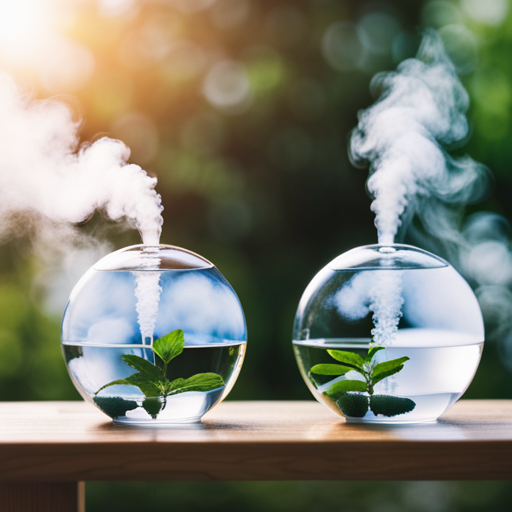Are you considering purchasing a humidifier for your home to combat dry winter air? If so, it is important to know that using the wrong type of water in your humidifier can lead to problems such as scaling, mineral buildup, and even harmful bacterial growth.
Distilled water and reverse osmosis treated water are both good options for use in humidifiers, but which one is the best choice for optimal humidity? In this article, we will explore the benefits and drawbacks of using reverse osmosis and distilled water in humidifiers to help you make an informed decision.
Using the right type of water in your humidifier can not only improve the overall performance of the machine, but it can also improve the air quality in your home. Proper maintenance and cleaning of your humidifier is crucial for preventing bacteria growth and prolonging the lifespan of the machine.
By understanding the benefits and risks associated with using reverse osmosis and distilled water in your humidifier, you can ensure that you are creating the optimal humidity environment for you and your family. Read on to learn more about the best water type for your humidifier, as well as tips for maintenance and cleaning to keep your machine running smoothly.
Key Takeaways
– Proper water usage in humidifiers is important to prevent scaling, mineral buildup, and harmful bacterial growth.
– Distilled water and reverse osmosis treated water are good options for humidifiers as they provide optimal humidity and avoid potential mineral buildup and scaling.
– Proper maintenance and cleaning of humidifiers is crucial to prevent bacteria growth and prolong the lifespan of the machine.
– Neglecting to clean the humidifier regularly can release harmful particles into the air, exacerbating respiratory issues.
Best Water Type
You should use either distilled water or reverse osmosis treated water for your humidifier to avoid mineral buildup and scaling, which can affect the machine’s performance and require regular cleaning and maintenance.
Distilled water is the purest form of water, as it’s been boiled and evaporated to remove all impurities and minerals. It’s readily available in stores and can be purchased in large quantities for humidifier use. However, the process of distillation can have an environmental impact, as it requires a significant amount of energy to produce.
Reverse osmosis treated water is another great option for your humidifier. This method removes impurities and minerals by forcing water through a semi-permeable membrane, which traps contaminants and allows pure water to pass through. Unlike distillation, reverse osmosis does not require heat and energy, making it a more environmentally friendly option. Additionally, reverse osmosis systems can be installed in homes for a continuous supply of treated water.
Overall, both distilled and reverse osmosis treated water are excellent choices for your humidifier, providing optimal humidity and avoiding potential mineral buildup and scaling.
Maintenance and Cleaning
To ensure your humidifier functions properly and remains free of bacteria and mineral buildup, it’s important to regularly clean and maintain it. Preventative measures include using only distilled or reverse osmosis treated water and changing the water daily.
In addition, follow the manufacturer’s instructions for cleaning your humidifier and use a cleaning solution specifically designed for humidifiers. Depending on the type of humidifier and frequency of use, cleaning should be done at least once a week to once every three months.
Cleaning frequency is important for preventing bacterial growth and mineral buildup in your humidifier. Neglecting to clean it regularly can result in the release of harmful particles into the air, which can exacerbate respiratory issues. It can also cause your humidifier to malfunction and reduce its effectiveness in maintaining optimal humidity levels.
Make sure to set a cleaning schedule and stick to it, and always unplug the humidifier before cleaning. With proper maintenance and cleaning, your humidifier can provide the benefits of improved indoor air quality and relief from dry air symptoms.
Benefits and Risks
Using a humidifier can be beneficial for improving indoor air quality and alleviating dry air symptoms, but it’s important to be aware of both the pros and cons of using one.
One of the benefits of using a humidifier is that it can help prevent dry skin and respiratory issues. It can also help reduce the spread of airborne viruses and bacteria. Additionally, when used properly, a humidifier can improve the comfort of your home by reducing static electricity and making the air feel warmer.
However, there are also some potential risks associated with using a humidifier. If not properly maintained and cleaned, humidifiers can become a breeding ground for bacteria and mold. This can lead to respiratory issues, especially for those with pre-existing conditions such as asthma or allergies. Additionally, using tap water in a humidifier can lead to mineral build-up, which can damage the unit and release harmful particles into the air.
Overall, while there are benefits to using a humidifier, it’s important to carefully consider the potential health effects and properly maintain the unit to ensure its safe and effective use.
